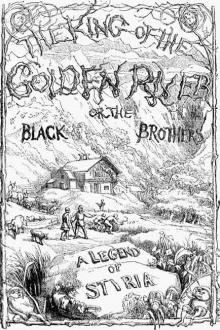The King of the Golden River or the Black Brothers - John Ruskin (free books to read TXT) 📗

- Author: John Ruskin
- Performer: -
Book online «The King of the Golden River or the Black Brothers - John Ruskin (free books to read TXT) 📗». Author John Ruskin
The Project Gutenberg EBook of The King of the Golden River or the Black
Brothers, by John Ruskin
This eBook is for the use of anyone anywhere at no cost and with
almost no restrictions whatsoever. You may copy it, give it away or
re-use it under the terms of the Project Gutenberg License included
with this eBook or online at www.gutenberg.org
Title: The King of the Golden River or the Black Brothers
A Legend of Stiria.
Author: John Ruskin
Illustrator: Richard Doyle
Release Date: September 8, 2010 [EBook #33673]
Language: English
*** START OF THIS PROJECT GUTENBERG EBOOK THE KING OF THE GOLDEN RIVER ***
Produced by Chris Curnow, Johnnie Hollowell and the Online
Distributed Proofreading Team at http://www.pgdp.net (This
file was produced from images generously made available
by The Internet Archive)
A Legend of Stiria.
ILLUSTRATED BY RICHARD DOYLE.
BOSTON:
PUBLISHED BY GINN & COMPANY.
1885.
The Publishers think it due to the Author of this Fairy Tale, to state the circumstances under which it appears.
THE KING OF THE GOLDEN RIVER was written in 1841, at the request of a very young lady, and solely for her amusement, without any idea of publication. It has since remained in the possession of a friend, to whose suggestion, and the passive assent of the Author, the Publishers are indebted for the opportunity of printing it.
The Illustrations, by Mr. Richard Doyle, will, it is hoped, be found to embody the Author's ideas with characteristic spirit.
CONTENTS CHAPTER I. HOW THE AGRICULTURAL SYSTEM OF THE BLACK BROTHERS WAS INTERFERED WITH BY SOUTH-WEST WIND, ESQUIRE 9 CHAPTER II. OF THE PROCEEDINGS OF THE THREE BROTHERS AFTER THE VISIT OF SOUTH-WEST WIND, ESQUIRE; AND HOW LITTLE GLUCK HAD AN INTERVIEW WITH THE KING OF THE GOLDEN RIVER 28 CHAPTER III. HOW MR. HANS SET OFF ON AN EXPEDITION TO THE GOLDEN RIVER, AND HOW HE PROSPERED THEREIN 40 CHAPTER IV. HOW MR. SCHWARTZ SET OFF ON AN EXPEDITION TO THE GOLDEN RIVER, AND HOW HE PROSPERED THEREIN 51 CHAPTER V. HOW LITTLE GLUCK SET OFF ON AN EXPEDITION TO THE GOLDEN RIVER, AND HOW HE PROSPERED THEREIN; WITH OTHER MATTERS OF INTEREST 56 LIST OF ILLUSTRATIONS.DESIGNED AND DRAWN ON WOOD BY RICHARD DOYLE
In a secluded and mountainous part of Stiria there was, in old time, a valley of the most surprising and luxuriant fertility. It was surrounded, on all sides, by steep and rocky mountains, rising into peaks, which were always covered with snow, and from which a number of torrents descended in constant cataracts. One of these fell westward, over the face of a crag so high, that, when the sun had set to everything else, and all below was darkness, his beams still shone full upon this waterfall, so that it looked like a shower of gold. It was, therefore, called by the people of the neighbourhood, the Golden River. It was strange that none of these streams fell into the valley itself. They all descended on the other side of the mountains, and wound away through broad plains and by populous cities. But the clouds were drawn so constantly to the snowy hills, and rested so softly in the circular hollow, that in time of drought and heat, when all the country round was burnt up, there was still rain in the little valley; and its crops were so heavy, and its hay so high, and its apples so red, and its grapes so blue, and its wine so rich, and its honey so sweet, that it was a marvel to every one who beheld it, and was commonly called the Treasure Valley.
The whole of this little valley belonged to three brothers, called Schwartz, Hans, and Gluck. Schwartz and Hans, the two elder brothers, were very ugly men, with over-hanging eyebrows and small dull eyes, which were always half shut, so that you couldn't see into them, and always fancied they saw very far into you. They lived by farming the Treasure Valley, and very good farmers they were. They killed everything that did not pay for its eating. They shot the blackbirds, because they pecked the fruit; and killed the hedgehogs, lest they should suck the cows; they poisoned the crickets for eating the crumbs in the kitchen; and smothered the cicadas, which used to sing all summer in the lime trees. They worked their servants without any wages, till they would not work any more, and then quarrelled with them, and turned them out of doors without paying them. It would have been very odd, if with such a farm, and such a system of farming, they hadn't got very rich; and very rich they did get. They generally contrived to keep their corn by them till it was very dear, and then sell it for twice its value; they had heaps of gold lying about on their floors, yet it was never known that they had given so much as a penny or a crust in charity; they never went to mass; grumbled perpetually at paying tithes; and were, in a word, of so cruel and grinding a temper, as to receive from all those with whom they had any dealings, the nickname of the "Black Brothers."
The youngest brother, Gluck, was as completely opposed, in both appearance and character, to his seniors as could possibly be imagined or desired. He was not above twelve years old, fair, blue-eyed, and kind in temper to every living thing. He did not, of course, agree particularly well with his brothers, or rather, they did not agree with him. He was usually appointed to the honourable office of turnspit, when there was anything to roast, which was not often; for, to do the brothers justice, they were hardly less sparing upon themselves than upon other people. At other times he used to clean the shoes, floors, and sometimes the plates, occasionally getting what was left on them, by way of encouragement, and a wholesome quantity of dry blows, by way of education.
Things went on in this manner for a long time. At last came a very wet summer, and everything went wrong in the country around. The hay had hardly been got in, when the haystacks were floated bodily down to the sea by an inundation; the vines were cut to pieces with the hail; the corn was all killed by a black blight; only in the Treasure Valley, as usual, all was safe. As it had rain when there was rain no where else, so it had sun when there was sun no where else. Every body came to buy corn at the farm, and went away pouring maledictions on the Black Brothers. They asked what they liked, and got it, except from the poor people, who could only beg, and several of whom were starved at their very door, without the slightest regard or notice.
It was drawing towards winter, and very cold weather, when one day the two elder brothers had gone out, with their usual warning to little Gluck, who was left to mind the roast, that he was to let nobody in, and give nothing out. Gluck sat down quite close to the fire, for it was raining very hard, and the kitchen walls were by no means dry or comfortable looking. He turned and turned, and the roast got nice and brown. "What a pity," thought Gluck, "my brothers never ask any body to dinner. I'm sure, when they've got such a nice piece of mutton as this, and nobody else has got so much as a piece of dry bread, it would do their hearts good to have somebody to eat it with them."
Just as he spoke, there came a double knock at the house door, yet heavy and dull, as though the knocker had been tied up—more like a puff than a knock.
"It must be the wind," said Gluck; "nobody else would venture to knock double knocks at our door."
No; it wasn't the wind: there it came again very hard, and what was particularly astounding, the knocker seemed to be in a hurry, and not to be in the least afraid of the consequences. Gluck went to the window, opened it, and put his head out to see who it was.
It was the most extraordinary looking little gentleman he had ever seen in his life. He had a very large nose, slightly brass-coloured; his cheeks were very round, and very red, and might have warranted a supposition that he had been blowing a refractory fire for the last eight-and-forty hours; his eyes twinkled merrily through long silky eyelashes, his moustaches curled twice round like a corkscrew on each side of his mouth, and his hair, of a curious mixed pepper-and-salt colour, descended far over his shoulders. He was about four feet six in height, and wore a conical pointed cap of nearly the same altitude, decorated with a black feather some three feet long. His doublet was prolonged behind into something resembling a violent exaggeration of what is now termed a "swallow tail," but was much obscured by the swelling folds of an enormous black, glossy-looking cloak, which must have been very much too long in calm weather, as the wind, whistling round the old house, carried it clear out from the wearer's shoulders to about four times his own length.
Gluck was so perfectly paralyzed by the singular appearance of his visitor, that he remained fixed without uttering a word, until the old gentleman, having performed another, and a more energetic concerto on the knocker, turned round to look after his fly-away cloak. In so doing he caught sight of Gluck's little yellow head jammed in the window, with its mouth and eyes very wide open indeed.
"Hollo!" said the little gentleman, "that's not the way to answer the door: I'm wet, let me in."
To do the little





Comments (0)